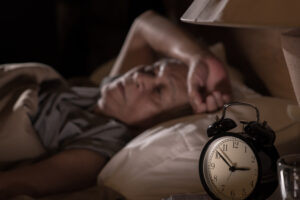 Of all the hints for maintaining your health as you age, getting more sleep is one of the most prominent. And the most confounding. Eat the right foods: whole grains, Mediterranean diet. Exercise, or at least walk every day. Drink plenty of water. If you’re thirsty it’s too late. And the list will end with the injunction to get enough sleep – they usually recommend seven to eight hours a night.
Of all the hints for maintaining your health as you age, getting more sleep is one of the most prominent. And the most confounding. Eat the right foods: whole grains, Mediterranean diet. Exercise, or at least walk every day. Drink plenty of water. If you’re thirsty it’s too late. And the list will end with the injunction to get enough sleep – they usually recommend seven to eight hours a night.
Sure, if you’re propping your eyelids open at 2:00 A.M. maybe you could ratchet it back to midnight. But what if you have trouble falling asleep? Or, worse yet, you fall asleep easily but wake up in the middle of the night and toss and turn for two hours or more? Listen to the experts and you’ll soon feel guilty about your bad sleep “habits.”
I fall into that last category. Several nights each week, I will wake up after about three hours of sleep and the brain gets going and before I know it I’m wide awake for a couple hours. In all my reading about how to solve this problem the only item that seemed to help a little was to get devices away from the bed. I started putting my cell phone and iPad in another room and found I woke up a little less often. But it didn’t really solve the problem.
Then I happened upon a little historical tidbit that I probably should have known all along. Before the invention of electricity, people mostly went to sleep when it got dark and left the bed when it got light in the morning. But it didn’t work exactly that smoothly. Especially in the winter, when nights were long, folks would wake up in the middle of the night, light the candles or gaslights, and do some reading, or maybe some household chores, or maybe that was their time for sex. Without the constant reminders to get more sleep, they didn’t feel guilty at all. That was just the way things were.
So you know what to do: sure, keep the electronic devices away from your bed; it can’t hurt. But if you wake up in the middle of the night, do something. Empty the dishwasher, read a book. Whatever you do, you’ll feel good about having used the time more productively than if you were watching the clock in bed and worrying about how unhealthy it is to be awake. You might even be glad that you got something done, and sleep peacefully till morning.
Norma Libman is a journalist and lecturer who has been collecting women’s stories for more than twenty years. You can read the first chapter of her award-winning book, Lonely River Village, at NormaLibman.com.